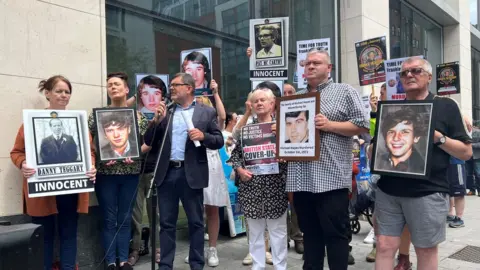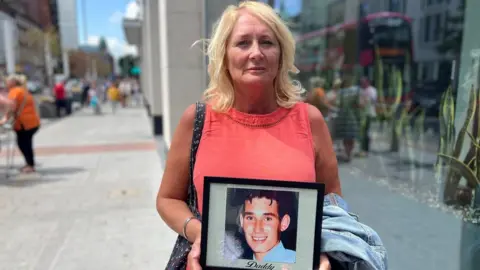NI legacy bill: Irish government considers legal action against UK
 BBC
BBCThe Irish government will consider legal action against the UK if a controversial legacy bill is enacted, the Taoiseach (Irish PM) has said.
He was responding to Sinn Féin leader Mary Lou McDonald who said the bill would "shut the door" on victims' access to justice in the courts.
She raised the issue in the Dáil (Irish parliament) ahead of a House of Lords debate on the bill at Westminster.
The legislation also offers a conditional amnesty to those accused of killings and other Troubles-related crimes.
 EPA-EFE/REX/Shutterstock
EPA-EFE/REX/ShutterstockResponding to Ms McDonald, Leo Varadkar said: "The bill has not yet been enacted, and certainly if it is enacted, if it does become law, we will then at that point give consideration to whether an interstate case is appropriate, so we certainly don't rule that out."
He described giving immunity to former army servicemen or paramilitaries who may have committed crimes as "entirely the wrong approach".
"We owe it to the victims to make sure that we all do everything we can to make sure that any information that can be given to the police is given to the police and that those people are prosecuted if at all possible," Mr Varadkar added.
Sir Jeffrey Donaldson, the leader of the DUP, also urged the prime minister not to go ahead with the proposed legislation.
He said: ''The government's legacy proposals have been rejected by the vast majority of victims and survivors, who suffered the most during the Troubles and who still live with the terrible legacy of pain, trauma and loss."
He described the amnesty proposals as an "affront to justice".
The legislation is on course to pass into law by summer, after its final stages in parliament.

'Fight for justice'
The daughter of a man who was fatally shot by the Army 50 years ago said it would be "devastating" if the inquest into his death is ended as a result of the legacy bill.
Father-of-four Thomas Burns, 32, was killed as he left a social club in north Belfast in 1972.
Mr Burns, a Catholic, had served in the Royal Navy for 10 years.
In March, the Attorney General directed that a new inquest into his death should take place.

But it is understood it is one of about 20 inquest cases yet to be heard, which could be affected by the new cut-off date of 1 May 2024 proposed in the legacy bill.
His daughter Patricia Burns was among campaigners protesting against the new legislation outside the Northern Ireland Office on Wednesday.
She said: "There is due to be a preliminary hearing on Friday, but we can't even accept that this inquest will happen yet.
"We could get a timetable but unless it is all finalised by May next year, it'll be wiped out if this bill goes through."
Ms Burns was six years old when her father died.
"My life has been taken over by this fight for justice, I haven't had a normal life. I don't want to leave my children to continue this fight, it needs finished now."

What is the legacy bill?
On Wednesday the bill starts its report stage in the House of Lords, which will continue into next week.
The bill is opposed by all Northern Ireland political parties, as well as groups representing bereaved families and victims of the Troubles.
The legislation will establish a new body, the Independent Commission for Reconciliation and Information Recovery (ICRIR), which would take over legacy cases.
In return for co-operation, it can grant suspects immunity from prosecution.
The bill is also set to prohibit new civil cases.
Peers will debate new amendments, which include a change to state any investigation run by the ICRIR must comply with obligations under the Human Rights Act 1998.
Also, the ICRIR would be "under a new duty to offer victims and their families the opportunity to submit personal impact statements".
